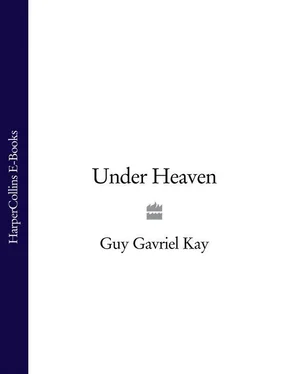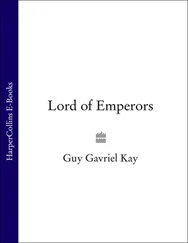If that decision carried an element of unspoken punishment for the young man having a rank he hadn’t earned, no one could possibly be faulted later for giving him the assignment.
It was an honour, wasn’t it? To be sent into danger? What else could a young officer want? This was a chance to claim glory. Why else were they here? You didn’t join the army to pursue a meditative life. Go be a hermit of the Path, eat acorns and berries in a cave on some mountainside, if that was what you wanted.
THEY WORSHIPPED the Horse God and the Lord of the Sky.
The Son of the Sky was the God of Death. His mother dwelled in the Bottomless Lake, far to the north. It froze in winter.
No, this was not the lake of their journey now, it was much farther north, guarded by demons.
In the afterworld, everything was reversed. Rivers ran from the sea, the sun rose west, winter was green. The dead were laid to rest on open grass, unburied, to be consumed by wolves and so returned to the Sky. Dishes and pottery were laid upside down or shattered by the body, food was spilled, weapons broken—so the dead could recognize and lay claim to these things in the backwards world.
The skulls of sacrificed horses (horned reindeer in the north) were split with an axe or sword. The animals would be reconstituted, whole and running, in the other place, though the white ones would be black and the dark ones light.
A woman and a man were cut to pieces at midsummer in rites only the shamans were allowed to share, though thousands and thousands of the nomads gathered for them from all across the steppe under the high sky.
Shamans engaged in their tasks wore metal mirrors about their bodies, and bells, so demons would be frightened by the sounds or by their own hideous reflection. Each shaman had a drum he or she had made after fasting alone upon the grass. The drums were also used to frighten demons away. They were made from bearskin, horsehide, reindeer. Tiger skin, though that was rare and spoke to a mighty power. Never wolf pelts. The relationship with wolves was complex.
Some would-be shamans died during that fast. Some were slain in their out-of-body journeys among the spirits. The demons could triumph, take any man’s soul, carry it off as a prize to their own red kingdom. That was what the shamans were all about: to defend ordinary men and women, intervene when spirits from the other side came malevolently near, whether of their own dark desire, or summoned.
Yes, they could be summoned. Yes, the riders believed that was what had happened here.
Moving slowly north with thirty of his own dui and fifteen of the nomads, accompanying the carried, curtained litter of Meshag, Tai couldn’t have explained why he asked so many questions, or hungered so deeply for the answers.
He told himself it was the length of the journey through an expanse of emptiness. Day after day they rode, and the grasslands hardly changed. But it was more than tedium and Tai knew it. The thrill he derived from the crystals of information the riders vouchsafed went beyond easing boredom.
They saw gazelles, great herds of them, almost unimaginably vast. They watched cranes and geese flying south, wave after wave as autumn came, bringing red and amber colours to the leaves. There were more trees now and more rolling hills as they moved out of the grasslands. One evening they saw swans alight on a small lake. One of Tai’s archers pointed, grinned, drew his bow. The Bogü stopped him with shouts of menace and alarm.
They never killed swans.
Swans carried the souls of the dead to the other world, and the carried soul, denied his destination, could haunt the killer—and his companions—to the end of their own days.
How could Tai explain how hearing this quickened his heartbeat, set his mind spinning with the strangeness of it all?
It was almost undignified: the Kitan were famously dismissive, never allowing themselves to be more than languidly amused by the primitive beliefs of the barbarians on their borders. Beliefs that confirmed their barely human nature, the appropriateness, in a world rightly ordered, of Kitan pre-eminence. Really: a people that left their dead to be devoured by wolves?
He told himself he was gathering information for his report, that it would be useful to have a fuller understanding of the Bogü, make it easier to guide and control them. It might even be true, but it didn’t explain how he felt when they told him, riding past crimson-and golden-leaved birch woods, of three-eyed demons in the north among sheets of ice, of how the men there grew autumn pelts like bears and slept the snowbound winter away. Or—again—of midsummer’s Red Sun Festival, when all wars stopped on the grassland for the rites of the Death God, performed by shamans of all tribes with bells and pounding drums.
The shamans. The bogï lay behind or at the heart of so many of the tales. They were taking Meshag to one of them. If he lived so long. This one was a mighty shaman, Tai was told. She dwelled on the shore of a lake, remote and mysterious. If sufficiently rewarded, and ardently beseeched, she might intervene.
She . That was interesting, as well.
The journey was taking them into territory controlled by the current kaghan, Dulan, their enemy. That was another reason why Tai and thirty of his cavalry were with this party, riding through an increasingly up-and-down russet-coloured autumn land, past jewel-bright stands of larch and birch, into a growing cold. They had an interest in what happened to Meshag, in his survival, however less likely that seemed every day.
He was still breathing. Tai looked in on his litter to confirm it each morning, at midday, and at sunset, enduring tired, hostile glares from the little shaman who never left Meshag’s side. The patient lay on his back under a horsehair blanket, breathing shallowly, never moving. If he died the Bogü would leave him under this sky and turn back.
Tai could see his own breath puffs when they mounted up at first light now. The day warmed as the sun climbed, but mornings and the nights were cold. They were so far from the empire, from any civilized place, in unnervingly strange lands. He had grown used to the howling of wolves by now, though all Kitan—a farming people—hated them with an ancient intensity.
Some of the big cats that roared at night were tigers, which they knew about, but some were not. These had a different sound, louder. Tai watched his men grow more uneasy with every li they rode away from all they knew.
They were not travellers, the Kitan. The occasional exception, a far-farer who returned, was celebrated as a hero, his written record of the journey widely copied and read, pondered with fascination and disbelief. He was often regarded, privately, as more than slightly mad. Why would a sane man choose to leave the civilized world?
The Silk Roads were for merchants and wealth to come to them , not so that they could go—or ever wished to go—to the far west themselves.
Or the far north, for that matter.
Heavier forests now, brilliant and alarming with autumn colour under the sun. A scatter of lakes strung like necklace ornaments. The sky itself too far away. As if, Tai thought, heaven was not as close to mankind here.
One of the Bogü told him, around a night fire under stars, that as winter approached, so did darker spirits. That, the nomad added, was why the magic that had assaulted Meshag this season had been harder for him to resist and required a powerful shaman to redress.
The shamans were divided into white and black. The division turned on whether they cajoled demons in the spirit world they left their bodies to enter, or tried to battle and coerce them. Yes, some were women. Yes, the one they were approaching was. No, none of the riders here had ever seen her, or been so far north themselves. (This did not reassure.)
Читать дальше












